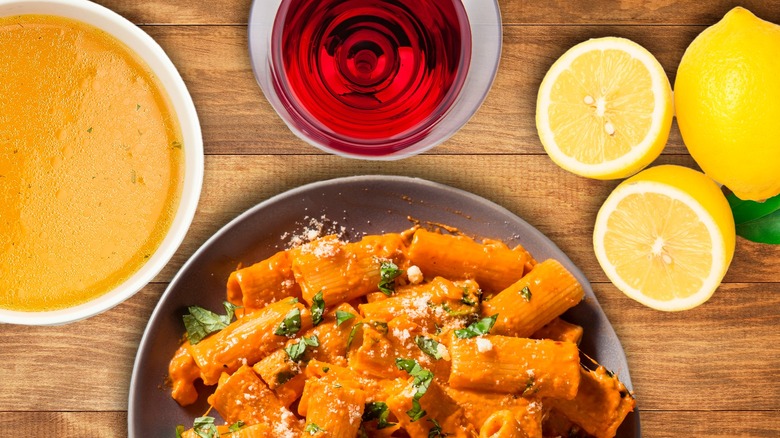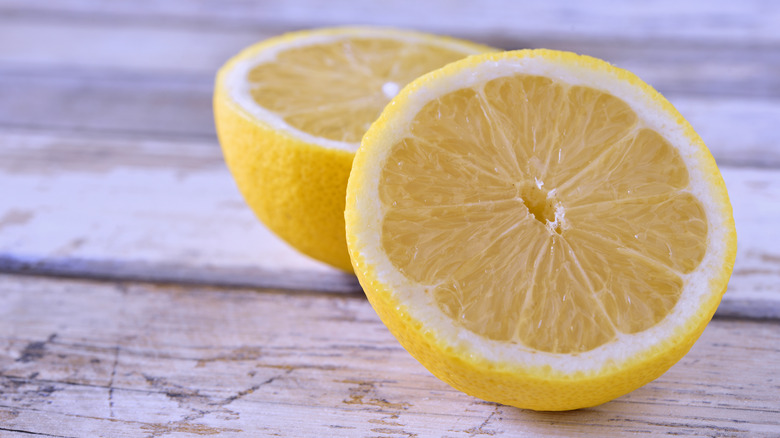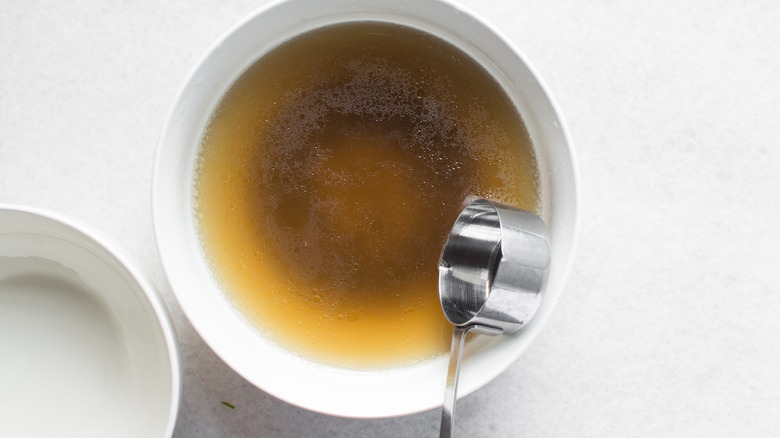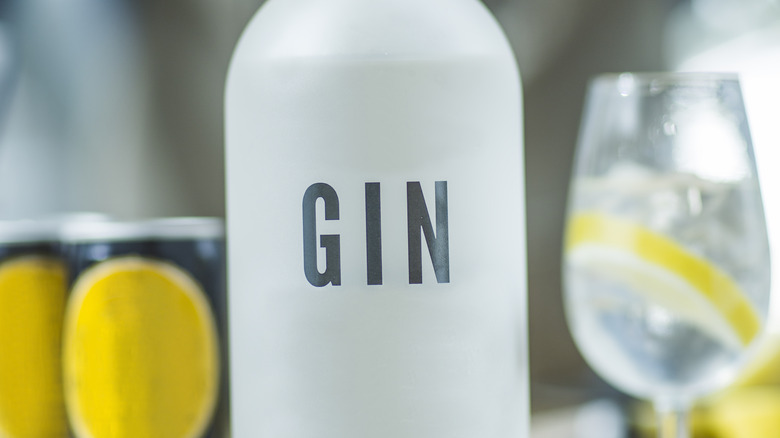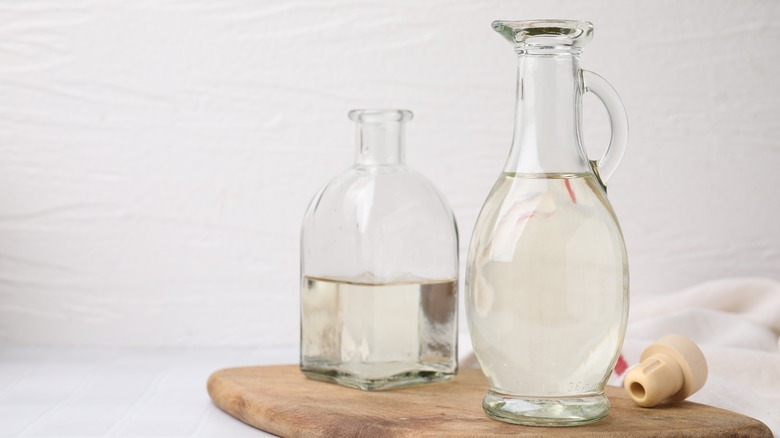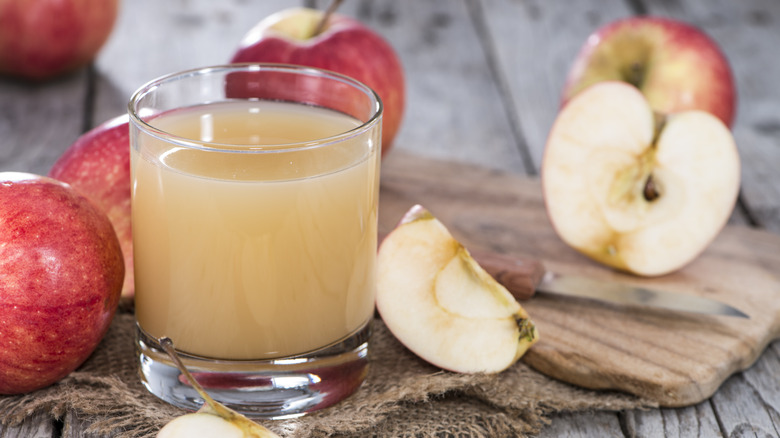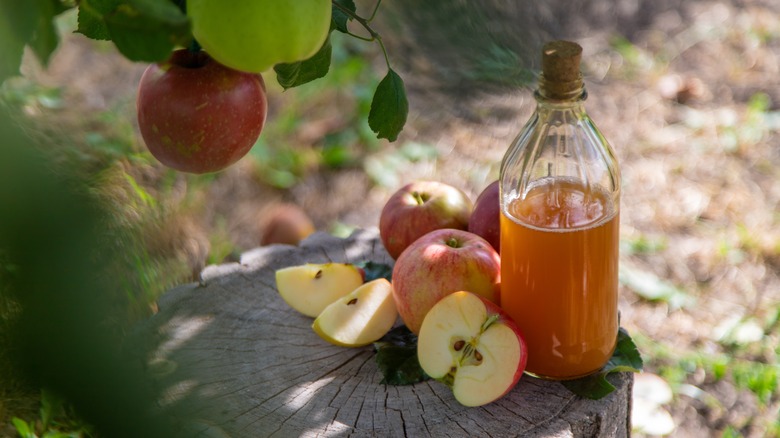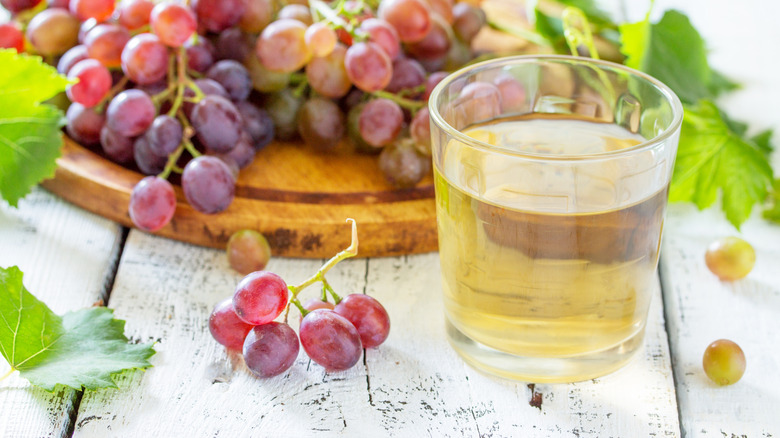10 Best Substitutions For Vodka In Pasta Sauce
When it comes to pasta dishes, penne alla vodka tends to be a fan favorite. It's uber creamy, tangy, rich in umami, and has that devilishly intriguing combination of tomato and dairy. Its Italian roots are up for debate, as some claim it was invented in New York City sometime between the 1970s and 1980s. Whatever the origin, one distinguishing factor makes it different from traditional Italian cuisine, which tends to be wine-heavy, and that's vodka. The only issue? Not everyone has a bottle of vodka ready, but luckily there are some fairly spot-on substitutions for vodka in pasta sauce.
So why add vodka, or any alcohol for that matter, in cooking? It can help to enhance the flavors. This happens through a chemical process in which alcohol, which is a polar molecule, helps to enhance the aromas. This enlightens our senses, helping to electrify and bind the gap between both the water-soluble and the fat molecules. Those subtle notes of flavor will no longer go unnoticed, thanks to just a small splash of red wine or vodka. If you're not comfortable using alcohol in your cooking, there are other options that can awaken the flavors. Luckily, no one recipe is set in its way, and there are plenty of alcoholic and non-alcoholic substitutes for vodka in penne alla vodka.
As a chef and recipe designer with expertise in the world of vegetarian cuisine, I am always looking for alternatives to obscure ingredients to make the cooking experience simpler and more enjoyable. Although my Italian ancestors would roll over in their graves at some of the substitutions that vary from tradition, I believe it's important to exercise culinary creativity to create new traditions. Experiment, adapt, and enjoy food that fits your pallet.
Lemon juice
As we understand, alcohol can help to enliven the flavor compounds in food. However, if you're looking for a non-alcoholic alternative to vodka that can have a similar effect, give lemon juice a try. Similar to salt, acidity can help kick flavor into gear. In fact, the two work similarly to help elevate the taste of your ingredients. Our taste buds detect the ions, and on top of that, sour foods can lead to elevated salivation. Believe it or not, saliva is what helps us to taste. This is why foods and even beverages are sometimes served with a lemon wedge.
Choose a juicy lemon by its weight. It should feel dense in your hand, and that doesn't mean the bigger the better. Cut just what you need from the lemon instead of slicing the whole thing up. This will keep your lemon from dying out for later use. Mix the lemon juice with a little water to dilute it before adding it to the cooking pot of vodka sauce (sans vodka). To avoid a powerful, lemony flavor, add a teaspoon or two of lemon juice mixed with the equivalent of water for a quart or more of sauce. Remember, you can always taste it and add more. Add it about halfway through the cooking process so it can interact with the other ingredients and cook down. Fresh lemon juice mixed with water added in the final stages of cooking can result in a powerful fruity flavor along with a watery sauce. It can also curdle the cream.
White wine
White wine is a triple threat when it comes to penna alla vodka, and here's why: It contains alcohol, acidity, and a hint of sweetness. All three of these elements help to enhance flavor. White wine is perhaps one of the best substitutions for vodka in pasta sauce because it doesn't have an unexpected flavor that doesn't typically align with pasta sauce. You've likely used white wine in your pasta recipes in the past, as grapes and tomatoes are a familiar pair.
When selecting which alcoholic beverage to add to a dish, consider what you might drink alongside it. While most tomato-based dishes are typically paired with red wine, pink sauces leave wiggle room for some lighter reds and white wines to make an appearance. This means you can use red, white, or dry pink wine in your penne alla vodka recipe. White wine has an advantage as it tends to have a lighter, more citrusy flavor without all of the tannins and overpowering flavors.
When selecting white wine for tomato sauce, aim for a dryer variety. If you have the option to choose, use chardonnay. It's a lower acidity wine, which helps to balance the acidity in the tomatoes. It is also quite buttery and smooth, adding a subtle depth and rounding out the flavors. Feel free to add a little more white wine than you might vodka, as it has a lesser alcohol content.
Broth or stock
If you'd rather keep things non-alcoholic, there is a flavor enhancer that works every time. Instead of reaching for the bottle, substitute this less expensive alternative: broth or stock. The difference between broth and stock has to do with both the ingredients and process. Stock is typically made with animal bones and spices, sometimes with drippings and vegetables. Broth is made mostly with meat, vegetables, and spices. Bone broth is stock that has been simmered on a lower heat for longer, extracting more of the marrow and collagen from the bones. Stock has a deeper flavor, so it would be my top pick for substituting vodka in pasta sauce.
Now, when selecting what kind of stock or broth to use, consider personal preference. Vegetable broth is a safe bet because it tends to pair well with just about any recipe, whether cream-based or tomato-based. Chicken broth has a fattier, richer flavor, while beef broth might be a bit overpowering for penne alla vodka.
Use at least double the amount of broth to vodka, if not more, and let it cook off. Stock and broth both tend to be salty, which can help enhance the flavors. The natural fats can help to add richness and a rounded mouthfeel. If you're using a storebought broth or stock, taste it first, as they tend to vary greatly in flavor. Alternatively, make your own broth at home. I would recommend an umami vegetable stock recipe to bring out the meaty flavor of the tomatoes. For the best flavors for both sauce and broth, the length of time you cook it is extremely important. Be sure to check out some important tips you need when making broth if it's your first time.
Red wine
Tomatoes and red grapes go together like peanut butter and jelly. These vineyard fruits can't go wrong, so when looking for the best substitutes for vodka in pasta, replace alcoholic potato juice with the red grape equivalent. Red wine is classically used in marinara sauce for several reasons. Firstly, as we know, alcohol dissolves fats which results in an enhancement of flavors. Secondly, the subtle sweetness balances the acidity of the tomatoes, and the flavors complement each other. Red wine is rich and robust, helping to amplify the intensity of the marinara, while the cream from the vodka sauce helps to level out the acidity and intensity of flavor.
When selecting a variety of red wines to replace vodka in penne alla vodka, go with a lighter, dryer wine like pinot noir. For a richer flavor, try a cabernet sauvignon. You'll want to avoid sweet wines and, if possible, spring for a lower-acidity variety. Grenache and merlot are also lower-acidity wines if you can't get your hands on a pinot or cab. Because red wine is strong in flavor, take note that it may change the flavoring of your dish. However, you can still add more red wine than you might vodka, but be sure to add it early enough in the process so it has time to cook off.
Gin
Many liquors are an acquired taste, and gin is no exception. Like vodka, it's a clear liquor but has strong juniper and citrus flavors. This is because when the grain alcohol is distilled, juniper berries and other botanicals are added. This unique flavor somehow seems to work with penne alla vodka as a vodka substitution. You simply add it in the same quantity at the same time as you would the vodka. However, when you substitute gin for vodka in cooking you can expect a subtle difference in flavor that tends to linger a bit longer on the tongue.
If you have concerns about the flavor being overly powerful or not aligning with your preferred flavor profile, consider adding it in small amounts to start. Even just a small splash will help to excite the flavors via the alcohol, and the biggest mistake you can make is over-pouring gin. When adding gin to tomato sauce, you can expect it to highlight the fruity notes of the tomatoes, as well as some fresh green flavors. Juniper is herby, and who doesn't love a herby Italian sauce?
White vinegar
White vinegar has a range of uses, from pickling cucumbers to cleaning your drains. But who knew it could be used as a substitution for vodka in pasta sauce? When creating a balanced mouthfeel, I've come to find that it's important to hit four particular flavors, no matter the dish. These flavors are sweet, salty, fatty, and acidic. The acidic component is often overlooked and is usually the reason you're left thinking something is missing, but you're not quite sure what. This happens quite a bit in soups and sauces in particular, and even just a dash of vinegar can balance those flavors beautifully.
When vinegar interacts with the ingredients, it brightens them, much like alcohol. White vinegar doesn't have an overpowering flavor profile besides the basic taste of vinegar. When replacing vodka with vinegar, be sure to use a mix of one part vinegar and one part water. This will help to dilute the vinegar so it's not too overpowering. This non-alcoholic alternative still offers a punch that is reminiscent of vodka. Just be sure that it has a chance to fully cook off, as you would do with vodka. Otherwise, you're going to be left with a pungent and bitter flavor that may just steal the show.
Apple cider and lime juice
Now, this combination may seem odd. In fact, you've probably never worked with it before. But apple cider and lime juice are two ingredients that mimic the aroma of vodka in cooking when combined. And even better? It's easy to get your hands on these ingredients as they are sold almost anywhere. This seemingly random combination works so well because the cider mimics the bitey and sweet notes of the vodka, while the acidity of the lime juice helps to emulsify the ingredients.
When replacing apple cider and lime juice with vodka for penne alla vodka, use a one-to-one ratio of the two ingredients. They should make up the same quantity as the amount of vodka called for. Add it when you would the vodka, and allow it to simmer and cook into the sauce. You'll find that the combination plays on your tongue as vodka would, dancing between bitter and sweet.
Now, we are very aware that limes are difficult to juice. Try the lime-cutting hack to get the most juice from your fruit. Slice the lime lengthwise instead of crosswise, and remove the core. Then you're free to squeeze away. But keep in mind that limes don't produce juice like lemons, so you should always buy a few at a time.
Brandy
Brandy has depth, which can translate into your dish. As a substitute for vodka in pasta sauce, keep in mind that it will alter the flavor slightly. However, depending on your flavor preferences, this might be a good thing. The alcohol in the brandy will activate your taste buds for a fuller eating experience. In addition, the subtle sweetness will help to balance the acidity of the tomatoes. Although originally made from grapes, it can be made from a variety of fruits, giving it a fruity flavor. This can help to parallel mild fruitiness from the tomatoes. Typically aged in oak barrels, there is an oaky and woody undertone of flavor that adds depth to the sauce, creating a smooth mouthfeel.
There are many types of brandy to choose from, and there are several that can work well in penne alla vodka. I would recommend either a grape or apple-based brandy. Some safe choices are calvados, applejack, and grappa, although if you feel confident in your knowledge of brandy, you can go with your gut.
If you find the scent or flavor of brandy to be overwhelming, try adding just half of the volume that is called for in place of vodka. Let it cook off for about half an hour and give it a taste. You can always add more, but the important part here is that it has time to interact with the other elements of the sauce. This is one of my favorite substitutions for vodka in pasta sauce because of its smooth undertones and subtle sweetness. The sweetness can help the tomatoes taste like they have been slowly simmered for hours, even if you are in a bit of a rush.
Apple cider vinegar
Much like an apple-based brandy or the shockingly spot-on combination of apple cider and lime juice, apple cider vinegar can make for a fantastic vodka replacement for your penne alla vodka. Because apples have a tartness balanced by sugars, the rounded flavor of apple cider vinegar can add flavorful elements to your sauce. The vinegar will excite the tomatoes and herbs, while the sugar will balance the acidity.
Use a mixture of half apple cider vinegar and half water, amounting to the volume of vodka called for in the recipe. Add it early enough, so it has a chance to cook off, and be sure not to add your cream until later in the game. This will prevent the cream from curdling when it comes in contact with the vinegar. Alternatively, you could use cashew cream instead of a dairy-based cream to prevent this interaction from occurring. And to excite your plant-based or lactose-intolerant guests.
Apple cider vinegar is vinegar made from apples instead of grapes. It's less sweet than balsamic but sweeter than white vinegar. It has a subtle apple flavor and is typically the color of a diluted apple cider. When consumed raw, it has incredible probiotic elements that can benefit your health, but it is also quite pungent and strong. As it cooks down, it will reduce and become sweeter, benefiting your sauce greatly.
White grape juice
Did you know that alcohol sometimes takes up to three hours to cook out of a dish? That is, besides whiskey that can cook out in a matter of minutes. So, if you're serving penne alla vodka to folks who strictly avoid alcohol, it's best to stick to some non-alcoholic alternatives when substituting vodka in pasta sauce. A great substitute for vodka is white grape juice.
White grape juice is quite fruity and can be very sweet. Some sweetness is encouraged in a pasta sauce, but you don't want to overpower the other flavors. This is why it's sometimes best to add a little lime juice to help balance those sweet notes and create a duo that can best emulsify your sauce.
If you're omitting the lime, use a mixture of one-half white grape juice and one-half water to amount to the volume of vodka called for. If you're using lime, then go for half grape juice and half lime juice. Avoid adding these too close to the end of the cooking process, and instead, add it when you would the vodka. The tart, sweet, and bitter notes will amplify your sauce to the max and create a bold and flavorful sauce that will have you drooling for more.
